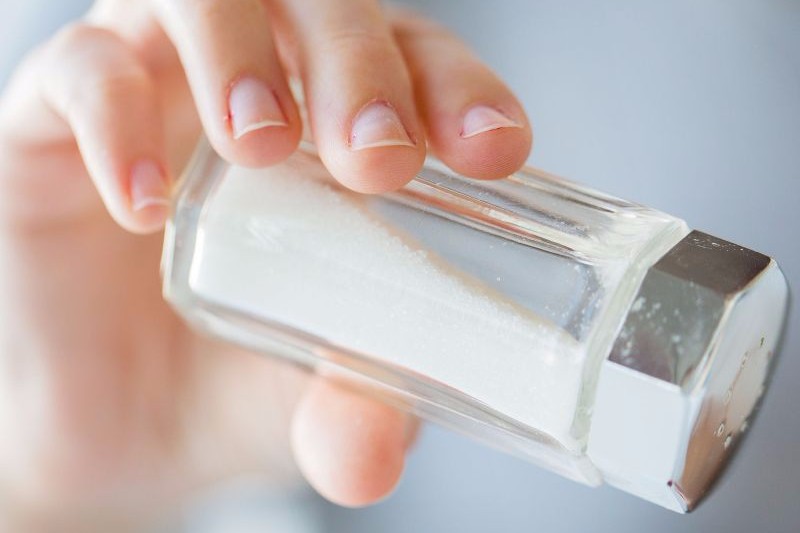High salt consumption can lead to dementia

A diet rich in salt reduces blood flow to the brain and causes dementia among mice, says a new study by scientists at Weill Cornell Medicine. Find out how salt consumption has been correlated with mental deficiencies! . The findings bring to light a potential future target for combating the harmful effects on the brain caused by excess salt. The lead author, Dr. Costantino Iadecola, director of the Mind Research Institute (BMRI), Neurology at Weill Cornell Medicine, said that they found that mice fed a salt-rich diet developed dementia even when blood pressure did not increase. This was surprising because in humans the salt's harmful effects on cognition were attributable to hypertension.
A large majority, about 90% of American adults, consume more sodium than the recommended daily dose of 2. 300 mg a day. Mice received 4% or 8% salt-containing foods, representing a 8 to 16-fold increase in salt versus a normal mouse diet. The upper level was comparable to high human salt consumption. After eight weeks, scientists examined mice using magnetic resonance imaging.
Mice showed significant reductions in resting brain blood flow in two brain areas involved in learning and memory: a decrease of 28% in the cortex and 25% in the hippocampus. Scientists have discovered that a dysfunction of blood vessel cells, called endothelial cells, has reduced the production of nitric oxide, a gas normally produced by endothelial cells to relax the blood vessels and increase blood flow. To see if the biological effects of a high salt diet could be reversed, Dr. Jadecola and his colleagues returned some mice to a regular / regular diet for four weeks and found that cerebral blood flow and endothelial function returned to normal. Rodents who only consumed high-salt diet developed dementia, showing significant deterioration in the results of object recognition, labyrinth and nest building - a typical daily life activity for normal mice.
Later, scientists conducted several experiments to understand the biological mechanisms that combine high salt intake with dementia. They found that mice developed an adaptive immune response in their intestines with increased activity of a subset of white blood cells that play an important role in the activity of other immune cells. The growth of these white blood cells, TH helper lymphocytes called TH17, has stimulated the production of a protein called interleukin 17 (IL-17) that regulates immune and inflammatory responses, resulting in a reduction in the production of nitric oxide in endothelial cells. In a final experiment, scientists treated mice with a known drug to prevent the suppression of nitric oxide activity, called the ROCK inhibitor Y27632. The drug reduced the level of IL-17 and the mice showed improved behavioral and cognitive functions,.
Iadecola. IL-17-ROCK is an exciting target for future research into the causes of cognitive impairment,. Giuseppe Faraco, assistant professor of neuroscience research at BMRI and the first author of the study. It appears to counteract the cerebrovascular and cognitive effects of a salt-rich diet and can also help people with illnesses and conditions associated with high levels of IL-17 such as multiple sclerosis, rheumatoid arthritis, inflammatory bowel disease and other diseases . .
Source : csid.ro
Views : 2708
Popular Article
- (photo) Nude becomes art.
Posted: 2018-03-17, 9113 views.
- The harmful effects of air conditioning on the skin
Posted: 2017-06-08, 7821 views.
- 3 causes of dyed hair discoloration
Posted: 2017-06-15, 7655 views.
- Why early puberty occurs in girls: symptoms, favors, diagnosis and treatment
Posted: 2017-10-24, 7534 views.
- Good or bad skin treatments in the hot season
Posted: 2017-06-07, 7287 views.
Recommendations
- (photo) Nude becomes art.
Posted: 2018-03-17, 9113 views.
- The harmful effects of air conditioning on the skin
Posted: 2017-06-08, 7821 views.
- 3 causes of dyed hair discoloration
Posted: 2017-06-15, 7655 views.
- Good or bad skin treatments in the hot season
Posted: 2017-06-07, 7287 views.
- Risks of practicing sports on hot days
Posted: 2017-06-12, 6880 views.
 4 effective ingredients in the fight against acne.
4 effective ingredients in the fight against acne. How to get rid of hiccups fast
How to get rid of hiccups fast The wheat bran diet: the secret of lost pounds as if by magic
The wheat bran diet: the secret of lost pounds as if by magic The recipe that will sweeten your soul this weekend!
The recipe that will sweeten your soul this weekend!  Is it dangerous or not to refreeze meat after thawing it?
Is it dangerous or not to refreeze meat after thawing it?  The unusual sign of diabetes indicated by saliva.
The unusual sign of diabetes indicated by saliva. What to drink to boost your immune system.
What to drink to boost your immune system. 10 foods that help you never age.
10 foods that help you never age. What actually happens in your body if you drink a cup of coffee for breakfast
What actually happens in your body if you drink a cup of coffee for breakfast 5 surprising benefits of chia seeds
5 surprising benefits of chia seeds